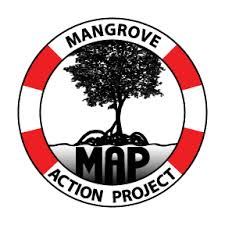MAP

Mangrove Action Project is taking a truly grassroots, bottom-up approach to mangrove conservation and restoration issues. Our approach involves and includes the voices of the global South, local communities, and their partner non-governmental organizations (NGOs).
MAP is unique in that it acts as a sort of megaphone, amplifying the voice of the coastal fishers in matters of relevance and importance to their lives. MAP also acts as a vital foot bridge or link between the global North and South on issues of over-consumption, deforestation, marine conservation, and human rights, as well as addressing such present day crises as climate change and sea level rise.
Mission:
Partnering with mangrove forest communities, grassroots NGOs, researchers, and local governments to conserve and restore mangrove forests and related coastal ecosystems, while promoting community-based sustainable management of coastal resources.
Witnessing firsthand the rapid devastation of the world’s mangrove forest wetlands and their associated coastal ecosystems, the founders of the Mangrove Action Project (MAP) decided in 1992 that it was time to form a global network to address the problems of mangrove loss worldwide. MAP has grown steadily during the last 20 years to become a respected member of the global environmental movement. MAP’s international network has grown to include over 500 NGOs and 350 scientists and academics from over 60 nations. In recent years, MAP has transformed from a network-and advocacy focused organization into one still involved in advocacy, but with programs and activities on the ground, supported through local offices in Thailand and Indonesia, as well as close partner groups in S. Asia, Latin America and S. Africa. MAP’s pro-active approach to long-term mangrove conservation involves: education, advocacy, collaboration, conservation and restoration, as well as sustainable community-based development.
MAP’s pro-active 5-pronged approach to long-term mangrove conservation involves:
- Networking
- Advocacy
- Education
- Conservation and Restoration
- Sustainablecommunity-based development
MAP’s International Network:
- over 450 NGOs
- 300 scientists and academics
- 60 nations